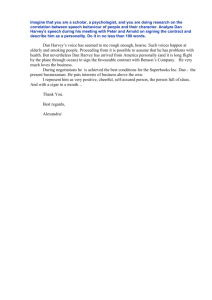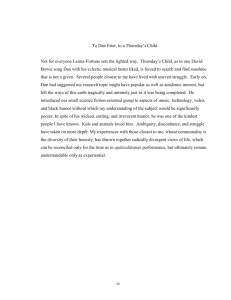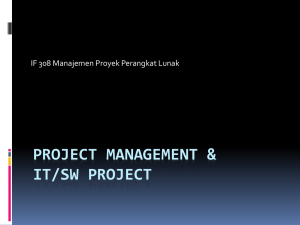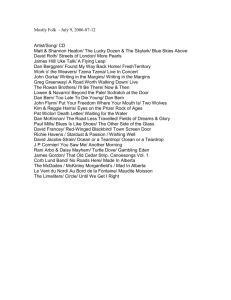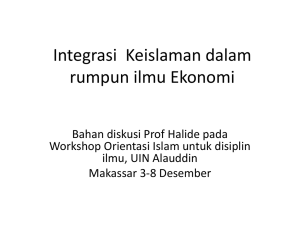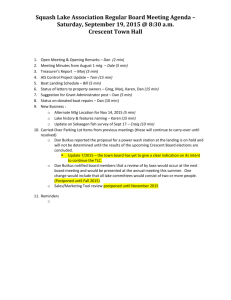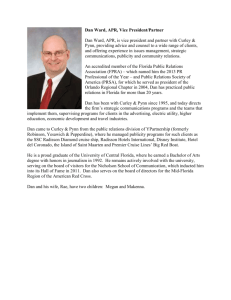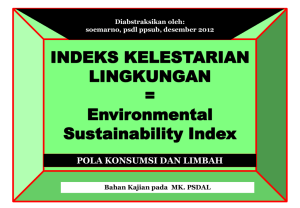Project - Manajemen Proyek Perangkat Lunak
advertisement
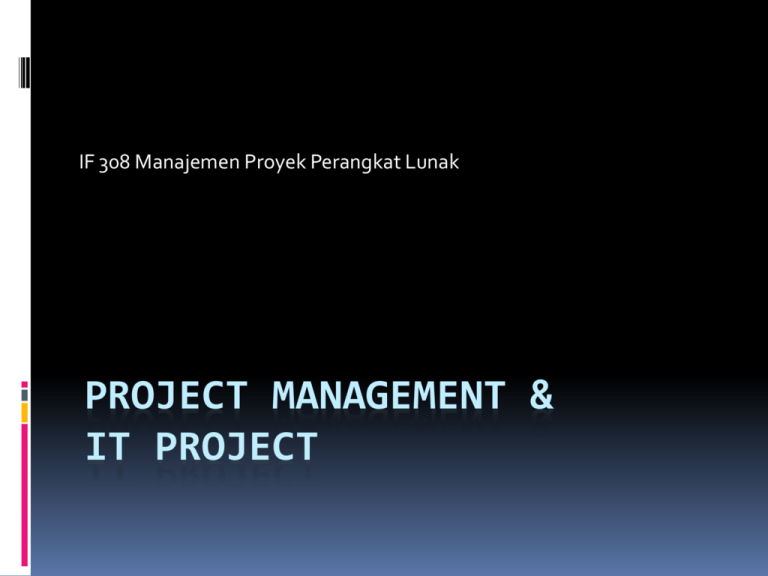
IF 308 Manajemen Proyek Perangkat Lunak PROJECT MANAGEMENT & IT PROJECT Tujuan Menjelaskan system view of project management dan bagaimana menerapkannya pada proyek IT Memahami organisasi, termasuk empat frame organisasi, struktur organisasi dan budaya organisasi Menerangkan mengapa manajemen stakeholder dan komitmen top management kritikal bagi kesuksesan proyek Mengerti konsep fase proyek dan siklus hidup dari proyek dan membedakan antara project development dan product development Mendiskusikan atribut unik dan sifat alami yang berbeda dari proyek IT Sebuah studi kasus Tom Walters baru saja menerima posisi baru di collegenya sbg Direktur Teknologi Informasi. Tom Walters seorang staf dosen yang dipercaya dan telah bekerja di college tersebut selama 15 tahun. College ini kecil, private/swasta di Southwest, menawarkan berbagai program pada bidang liberal arts dan professional areas. Jumlah student body: 1500 full-time student dan 1000 working-adult students Banyak instruktur memberikan kuliahnya dengan menambah informasi dari Internet dan web site matakuliah, tetapi tidak menawarkan program distancelearning. Seperti umumnya college, penggunaan teknologi informasi sudah menjadi trend dalam 5 tahun terakhir. Sebuah studi kasus-lanjutan Ada beberapa ruangan kelas di kampus dengan komputer bagi instruktur dan student dan kebanyakan hanya dengan station instruktur dan sistem proyektor. Tom Walters tahu bahwa beberapa college di negara bagiannya meminta semua studentnya lease laptop dan memasukkannya sebagai komponen teknologi ke dalam banyak mata kuliah. Ide ini menggairahkan Tom. Dia dan dua personil departemen IT mengunjungi college lain yang telah meminta semua studentnya untuk lease laptop dalam 3 tahun terakhir; mereka sangat impressif dengan apa yang mereka lihat dan dengar Tom dan stafnya membuat sebuah perencanaan untuk memulai meminta student untuk lease laptop di collegenya untuk tahun depan Tom mengirim sebuah email ke semua dosen dan staf pada bulan September, yang dengan singkat menggambarkan rencana ini dan rencana lainnya. Namun dia tidak mendapatkan banyak respon, sampai bulan Februari pada pertemuan dosen, Tom menerangkan detil dari rencananya. Sebuah studi kasus-lanjutan Namun chairs dari departemen History, English, Philosophy and Economics menyatakan penolakan atau berbeda dengan ide tersebut. Mereka serentak menyatakan bahwa college ini bukan sekolah pelatihan teknikal dan berpikir ide itu tidak beralasan alias bodoh. Staf dosen dari departemen Ilmu Komputer menyatakan kepeduliaannya bahwa student mereka telah memiliki komputer dekstop yang canggih dan tidak ingin membayar lagi untuk membeli cicil laptop yang less-powerfull. Direktur program adult-education mengeluhkan terkait sudah meningkatnya pembayaran yang harus dilakukan oleh studennya. Tom sangat shock mendengar respon dari semua koleganya, terutama karena dia dan stafnya telah meluangkan banyak waktu untuk mendetilkan perencanaan bagaimana mengimplementasikan laptop di kampusnya. NOW WHAT SHOULD HE DO? Projects Cannot Be Run in Isolation Projects must operate in a broad organizational environment Project managers need to use systems thinking Taking a holistic view of carrying out projects within the context of the organization Senior managers must make sure projects continue to support current business needs System view of Project Management A systems approach emerged in the 1950s to describe a more analytical approach to management and problem solving Three parts include: Systems philosophy: an overall model for thinking about things as systems Systems analysis: problem-solving approach Systems management: address business, technological, and organizational issues before making changes to systems Three Sphere Model for Systems Management Understanding Organizations Structural frame: Focuses on roles and responsibilities, coordination and control. Organization charts help define this frame. Human resources frame: Focuses on providing harmony between needs of the organization and needs of people. Political frame: Assumes organizations are coalitions composed of varied individuals and interest groups. Conflict and power are key issues. Symbolic frame: Focuses on symbols and meanings related to events. Culture is important. Organizational Structures Three basic organization structures Functional: functional managers report to the CEO Project: program managers report to the CEO Matrix: middle ground between functional and project structures; personnel often report to two or more bosses; structure can be weak, balanced, or strong matrix Functional, Project, and Matrix Organizational Structures Organizational Structure Influences on Projects Project Characteristics Functional Project manager’s authority Little or none Percent of performing organization’s personnel assigned full-time to project work Who controls the project budget Virtually none Project manager’s role Common title for project manager’s role Organizational Structure Type Matrix Weak Matrix Balanced Strong Matrix Matrix Limited Low to Moderate Moderate to high 0-25% 15-60% 50-95% Project High to almost total 85-100% Functional manager Functional manager Mixed Project manager Project manager Part-time Part-time Full-time Full-time Full-time Project Coordinator/ Project Leader Project Coordinator/ Project Leader Part-time Project Manager/ Project Officer Part-time Project Manager/ Program Manager Full-time Project Manager/ Program Manager Full-time Project management Part-time administrative staff PMBOK Guide, 2000, 19, and PMBOK Guide 2004, 28. Organizational Culture Organizational culture is a set of shared assumptions, values, and behaviors that characterize the functioning of an organization Many experts believe the underlying causes of many companies’ problems are not the structure or staff, but the culture Ten Characteristics of Organizational Culture Member identity* Risk tolerance* Group emphasis* Reward criteria* People focus Conflict tolerance* Unit integration* Means-ends Control orientation Open-systems focus* *Project work is most successful in an organizational culture where these items are strong/high and other items are balanced Stakeholder Management Project managers must take time to identify, understand, and manage relationships with all project stakeholders Using the four frames of organizations can help meet stakeholder needs and expectations Senior executives/top management are very important stakeholders Best Practice IT governance addresses the authority and control for key IT activities in organizations, including IT infrastructure, IT use, and project management A lack of IT governance can be dangerous, as evidenced by three well-publicized IT project failures in Australia (Sydney Water’s customer relationship management system, the Royal Melbourne Institute of Technology’s academic management system, and One.Tel’s billing system) Need for Organizational Commitment to Information Technology (IT) If the organization has a negative attitude toward IT, it will be difficult for an IT project to succeed Having a Chief Information Officer (CIO) at a high level in the organization helps IT projects Assigning non-IT people to IT projects also encourages more commitment Need for Organizational Standards Standards and guidelines help project managers be more effective Senior management can encourage: The use of standard forms and software for project management The development and use of guidelines for writing project plans or providing status information The creation of a project management office or center of excellence Project Phases and the Project Life Cycle A project life cycle is a collection of project phases that defines: What work will be performed in each phase What deliverables will be produced and when Who is involved in each phase How management will control and approve work produced in each phase A deliverable is a product or service produced or provided as part of a project More on Project Phases In early phases of a project life cycle: Resource needs are usually lowest The level of uncertainty (risk) is highest Project stakeholders have the greatest opportunity to influence the project In middle phases of a project life cycle: The certainty of completing a project improves More resources are needed The final phase of a project life cycle focuses on: Ensuring that project requirements were met The sponsor approves completion of the project Phases of the Traditional Project Life Cycle Product Life Cycles Products also have life cycles The Systems Development Life Cycle (SDLC) is a framework for describing the phases involved in developing and maintaining information systems Systems development projects can follow: Predictive life cycle: the scope of the project can be clearly articulated and the schedule and cost can be predicted Adaptive Software Development (ASD) life cycle: requirements cannot be clearly expressed, projects are mission driven and component based, using time-based cycles to meet target dates Predictive Life Cycle Models Waterfall model: has well-defined, linear stages of systems development and support Spiral model: shows that software is developed using an iterative or spiral approach rather than a linear approach Incremental build model: provides for progressive development of operational software Prototyping model: used for developing prototypes to clarify user requirements Rapid Application Development (RAD) model: used to produce systems quickly without sacrificing quality The Importance of Project Phases and Management Reviews A project should successfully pass through each of the project phases in order to continue on to the next Management reviews, also called phase exits or kill points, should occur after each phase to evaluate the project’s progress, likely success, and continued compatibility with organizational goals The Context of IT Projects IT projects can be very diverse in terms of size, complexity, products produced, application area, and resource requirements IT project team members often have diverse backgrounds and skill sets IT projects use diverse technologies that change rapidly; even within one technology area, people must be highly specialized Resources slide pf presentation Information Technology Project Management, Kathy Schwalbe, Fifth Edition, Copyright 2007

